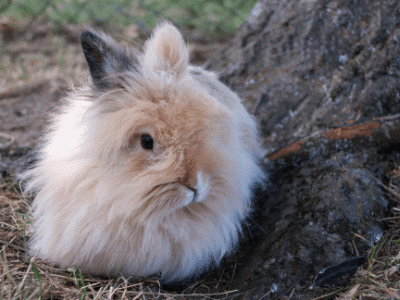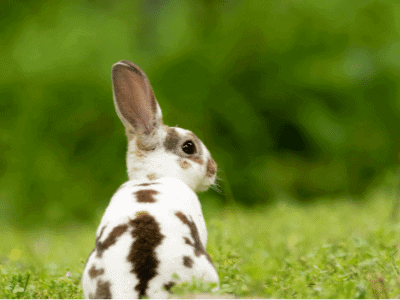Shedding is common in all rabbit breeds.
However, some rabbit breeds shed less in comparison to other breeds. This could be a result of various internal and external factors.
Which rabbit breed sheds the least? Angora and Mini Rex Rabbit breeds shed the least. However, it is not true in all cases.
The shedding in the rabbit is dependent on a lot of other conditions such as its genes, the weather fluctuations in the area, and also the food that your bunny consumes.
In many cases, stressful situations can cause a rabbit to shed its fur. Let us discuss the shedding in rabbit breeds in detail.
Which Rabbit Breed Sheds the Least?
Angora rabbit breed is one of the oldest domesticated rabbit breeds.

They look adorable with their long fur covering the undercoat. These rabbits were traditionally bred for their long lustrous coat, known as Angora wool.
This breed can further be categorized into 11 subcategories of Angora rabbits. These subcategories differ in the weight, size, and texture of their coats.
Since the rabbit was bred with the sole intention of procuring its fur, the effect is clearly visible on its long luxurious coat.
Their coat is healthier and sheds less compared to other rabbit breeds.
However, their long fur is prone to matting and dullness and requires regular brushing to get rid of dirt and debris and to maintain its natural shine.
The shedding is dependent on the care that the coat receives. However, they are not hypoallergenic, so if you have a family member that is allergic, you need to be careful.
Shedding in Mini Rex breed
These bunnies are small creatures weighing around 3-5lbs. However, they are extremely beautiful and cuddly.

Their coat consists of short hair. The secondary guard hairs are not as long as Angora rabbits; it is similar in length to their undercoat.
Their coat looks smooth, neat, and has an extremely velvety feel. They do not require much grooming, and their fur does not collect many particles.
This breed does shed like any other rabbit breed. However, it does not create much of a mess. The reason is their fur is small and neat.
It is fairly simple to clean up the shed of a Mini Rex, and it may seem like they do not shed a lot. Mini Rex rabbits are not hypoallergenic.
Factors that can Affect Shedding in Rabbit Breed
The shedding in both Angora & Mini Rex rabbits is dependent on a few factors.
These factors are also applicable in shedding to other rabbit breeds. Some of them are mentioned below:
Breeding and Hereditary
Rabbits or any other animal, for that matter, can be bred to have certain specific qualities.
Breeders are experts in bringing these qualities in the animal in their desired form.
This is dependent on the parents of a rabbit as it picks on the genes it receives from its parents.
Some breeders focus on breeding rabbits that specifically shed less. Such planned breeding can affect shedding in most rabbits.
Change in Weather Conditions
Fur for bunnies is not just an ornamental feature.
It also assists them to maintain their body temperature.
If you live in a climate that is more susceptible to change in weather, your rabbit will shed more than usual.
When colder weather is approaching, rabbits will shed their summer coat and pile on heavy coats for winters.
When the weather becomes hot, they shed into a sparse coat to maintain the body heat.
Food Habits Affect Shedding in Rabbit
Food habits in rabbit breeds are also responsible for their shedding. Bunnies on a healthier diet experience lesser shedding compared to other breeds.
A healthy rabbit diet consists of hay, pellets, fresh leafy veggies, and lots of water.
Also, the level of protein in the diet can fluctuate the shedding. A high protein diet can cause rabbits to shed more.
However, this is not true in the case of all rabbits. Give your rabbit a low protein diet for a week to see the changes in shedding patterns.
If it works, you can continue the diet to help your rabbit shed less than usual.
Also read: Are Rabbits Good Pets for Seniors?
Some Common FAQs about Bunnies and Shedding/Molting
Do all bunnies shed?
All rabbits shed, but the amount and frequency of shedding can vary depending on the breed and individual rabbit.
Some rabbits may only shed a little bit every once in a while, while others may shed more frequently.
Generally, baby bunnies will shed more frequently than adults because they are growing and replacing their fur faster.
Typically, rabbits will shed twice a year (and sometimes even more).
During a shedding period, you may notice an increase in the amount of rabbit fur around your home.
It’s important not to worry – this is completely normal! Help your bunny stay healthy and comfortable by keeping her environment clean and free of excess hair.
Regular brushing can help remove some of the loose hair, but there’s really no way to completely stop them from shedding.
Do rabbits get grumpy when they molt?
Some rabbits may get grumpy when they molt, but it’s not a universal behavior (depending on the rabbit breed and personality).
This is because, during the molting process, rabbits lose a lot of hair, and that can make them feel quite uncomfortable.
In addition, losing all that hair can also leave them feeling a bit exposed and vulnerable. So if your rabbit seems to be in a particularly bad mood during the molting process, just try to be understanding and give her some extra care and attention.
If your rabbit seems particularly grumpy during this time, you can try providing him with some extra hay or fresh vegetables to help make him feel more comfortable.
What Bunny does not shed?
All bunnies shed (some less than others)
There are a few breeds of bunny that shed less, but typically they are the smaller breeds.
Rex bunnies – who have short, curly fur – don’t shed as much as other rabbits.
Generally speaking, though, all rabbits will shed some fur throughout the year. During certain times of year – like spring and fall – they’ll shed more than usual, and during other times – like winter and summer – they’ll shed less.
Other articles you may also find useful:
- 10 Calmest/Friendliest Breeds of Rabbit (with Images)
- Why does my rabbit have red eyes?
- How to treat sores on rabbit’s feet?
- Can I Shave My Lionhead Rabbit?
- 8 Rare Breeds of Rabbit (with Images)
- 10 Most Expensive Rabbit Breeds (with Images)
- 5 Smallest Breed of Pet Rabbits (You Can Buy)
- What Shampoo is Safe for Rabbits?

